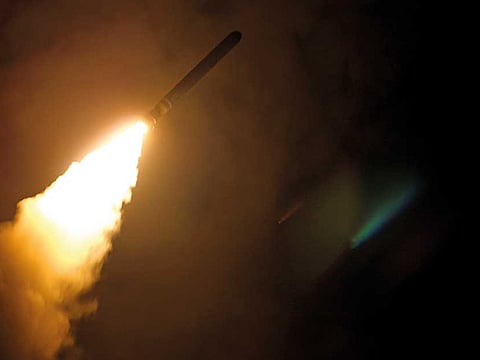US strikes on Syria deliver a strong message
A newspaper questions whether Trump’s ‘mission accomplished’ bravado was justified

Strikes by the US, Britain and France on Saturday against Syrian targets in response to the Bashar Al Assad regime’s chemical attack on Douma was at the centre of global media attention this week.
In a sharp editorial Washington Post affirmed that President Donald Trump was right to strike Syria. “It is vital that the international prohibition against the use of horrific agents be upheld; the participation of Britain and France in the operation was important in that respect. Trump challenged Russia and Iran on their support for the [Al] Assad regime, saying ‘no nation can succeed in the long run by promoting rogue states, brutal tyrants and murderous dictators.’ But Moscow and Tehran will not be swayed by moral arguments.
The United States must use the leverage it has on the ground, by maintaining and, if necessary, further fortifying its position in the country. It should work to stabilise eastern Syria under local authorities, including Kurds, while demanding an acceptable political settlement brokered by the United Nations. Only then, with the departure of the [Al] Assad regime, will it be possible to ensure that Syrians do not suffer more atrocities, by chemical weapons or by other means.”
The Guardian called the strikes a politically significant move by Theresa May. It struck a note of caution though, “May took military action despite public sentiment (without approval of the Parliament). The Syrian president will see no threat to his hold on power and no change on the trajectory of the Syrian war. Even worse, ordinary Syrians will wonder why the west acted after 1,900 people were killed by chemical weapons, when 400,000 have lost their lives to conventional weapons in the grisly civil war. Syria will continue as a zone of instability as long as [Al] Assad remains in place.”
Hailing America’s coordinated strike with Britain and France, the New York Times noted, “Donald Trump has sometimes seemed to view military action as a game and foreign policy as something set by online taunts. He seemed to think that as commander in chief he could simply follow his whims. So it was reassuring that his military response to a suspected chemical attack that killed dozens of people in the rebel-held Damascus suburb of Douma on April 7 was coordinated with Britain and France.”
The Hindu struck a prudent note, questioning whether Trump’s “mission accomplished” bravado was justified. “The fact that a provocation was perceived for a second strike within a year suggests that the first one failed to deter the [Al] Assad regime. On the other hand, Trump has dragged the US deeper into the Syrian civil war. If there is a future chemical attack, either by [Al] Assad or by his rivals, the US will be forced to act again, perhaps more harshly. Worryingly, every time the US bombs Syria, the chances of a military confrontation in the country between the US and Russia heightens, given that Moscow remains firmly behind [Al] Assad. What Syrians need is not more bombs and missiles, but an end to the war, which has killed at least 400,000 people in seven years.”
The editorial writers of the Los Angeles Times endorsed the US stance of keeping the strikes limited and thereby averting a major conflict. “It has been clear for some time — telegraphed in typically blustering language on Twitter — that President Trump intended to make Syrian President Bashar [Al] Assad pay a price for the poisoning deaths of dozens of people earlier this month in the rebel-held town of Douma. Some of those who believe the US should play a larger role in the Syrian conflict had hoped that Trump’s retaliation for the use of chemical weapons in Douma would be an attack powerful enough to destroy much of [Al] Assad’s military. The president, wisely, rejected that advice. A more ambitious military strike would have posed the immediate danger of a confrontation with Russian forces and other consequences, not all of them foreseeable,” the paper editorialised.


